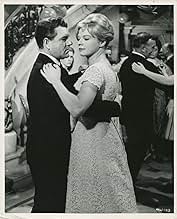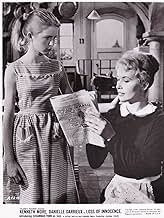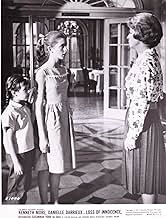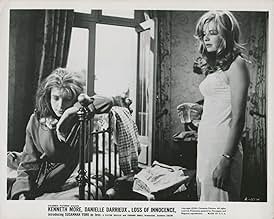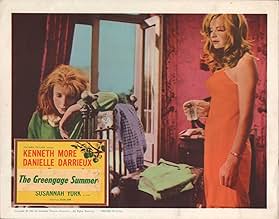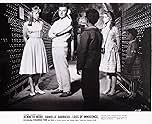IMDb RATING
6.7/10
631
YOUR RATING
Teenage Joss Grey vacations in France with her family. Her mother falls ill, leaving her in the care of a hotel manager having an affair with a charming older man towards whom Joss develops ... Read allTeenage Joss Grey vacations in France with her family. Her mother falls ill, leaving her in the care of a hotel manager having an affair with a charming older man towards whom Joss develops an attraction, transitioning from girl to woman.Teenage Joss Grey vacations in France with her family. Her mother falls ill, leaving her in the care of a hotel manager having an affair with a charming older man towards whom Joss develops an attraction, transitioning from girl to woman.
Raymond Gérôme
- Renard
- (as Raymond Gerome)
André Maranne
- Monsieur Dufour
- (as Andre Maranne)
Harold Kasket
- Monsieur Prideaux
- (as Harold Kaskett)
Jacques B. Brunius
- Monsieur Joubert
- (as Jacques Brunius)
Will Stampe
- Monsieur Armand
- (as Will Stamp)
Jacques Dhéry
- Bargee
- (as Jacques Dhery)
Featured reviews
I saw this lovely little film shortly after it first appeared. It is a thoroughly charming and winning motion picture about first love, disillusionment, and acknowledgement, as the young and lovely Susannah York comes of age. She is absolutely winning in one of her first major roles. Kenneth More is superb as the object of York's unrequited affections, and Danielle Darrieux is splendid as More's jealous lover. Wonderful scenes of the French countryside (I remember especially a charming visit to a wine chateau) make this a delightfully wistful experience.
The alternative title for this film is The Loss of Innocence, which sounds deceptively exploitative. It is however an appropriate description of a charming yet sinister film.
The film is set in the Champagne Country in France, so we get some lush views of the French countryside and even a look into the champagne caves. That alone would probably be enough for some people but we have a great story too: four children (for those who read the book, the character of Cecil has been merged with Hester) are left on their own in a grand hotel in France when their mother gets taken ill. Thirteen-year-old Hester, the second eldest, takes charge of The Littles (their name for the two young children) as she has the best knowledge of French, but it is the eldest child, sixteen-year-old Joss, that blossoms almost overnight. Her beauty captures the heart of their unofficial guardian, middle-aged Englishman Eliot, and Joss soon becomes entangled in a love triangle between her, Eliot, and co-owner of the hotel, Madame Zizi. Further complications arise when Eliot proves himself to be untrustworthy, perhaps even criminal...
The novel has been diluted in the transition to film. The novel's equivalent of Hester, Cecil, is the narrator of the novel, so we see her sister's sexual awakening through her eyes. Cecil also undergoes a transition into womanhood, however all hints of this are eradicated in the film. Whether this is due to time restrictions or trying to please the censors is unclear. The focus of the film is on Joss and her coming-of-age. Fans of the book may be disappointed that Susannah York does not have the exotic dark beauty that Joss is supposed to have, but she is suitably pretty and passes as a sixteen-year-old who is just turning into a woman. She also resembles Sue Lyon in Lolita, which came out in the same year, and the two films have some similarities in that relationship. Kenneth More is a bit old to play Eliot so one might have to stretch their imagination to believe that Joss fancies him. He also doesn't have the suaveness or mysteriousness of Eliot in the novel. However he does have a chirpy charm and works well with the children. A mention should also go to Jane Asher, who plays Hester's curiosity of the adult world very effectively.
Although the film does not capture the darkness and perfection of the novel, it remains a nice exploration of the process of growing up.
The film is set in the Champagne Country in France, so we get some lush views of the French countryside and even a look into the champagne caves. That alone would probably be enough for some people but we have a great story too: four children (for those who read the book, the character of Cecil has been merged with Hester) are left on their own in a grand hotel in France when their mother gets taken ill. Thirteen-year-old Hester, the second eldest, takes charge of The Littles (their name for the two young children) as she has the best knowledge of French, but it is the eldest child, sixteen-year-old Joss, that blossoms almost overnight. Her beauty captures the heart of their unofficial guardian, middle-aged Englishman Eliot, and Joss soon becomes entangled in a love triangle between her, Eliot, and co-owner of the hotel, Madame Zizi. Further complications arise when Eliot proves himself to be untrustworthy, perhaps even criminal...
The novel has been diluted in the transition to film. The novel's equivalent of Hester, Cecil, is the narrator of the novel, so we see her sister's sexual awakening through her eyes. Cecil also undergoes a transition into womanhood, however all hints of this are eradicated in the film. Whether this is due to time restrictions or trying to please the censors is unclear. The focus of the film is on Joss and her coming-of-age. Fans of the book may be disappointed that Susannah York does not have the exotic dark beauty that Joss is supposed to have, but she is suitably pretty and passes as a sixteen-year-old who is just turning into a woman. She also resembles Sue Lyon in Lolita, which came out in the same year, and the two films have some similarities in that relationship. Kenneth More is a bit old to play Eliot so one might have to stretch their imagination to believe that Joss fancies him. He also doesn't have the suaveness or mysteriousness of Eliot in the novel. However he does have a chirpy charm and works well with the children. A mention should also go to Jane Asher, who plays Hester's curiosity of the adult world very effectively.
Although the film does not capture the darkness and perfection of the novel, it remains a nice exploration of the process of growing up.
Susannah York is astonishingly good as a sixteen-year old British girl, traveling through France with her mother and three younger siblings, who falls in love for the first time with a handsome, older man (Kenneth More) harboring a guilty secret. The kids, who are left temporarily without their mum after she takes sick, arrive at their hotel in France's Champagne Country to an ill-wind: the two lesbian women who run the extravagant spread do not permit children, but one of the ladies is also involved with More and he takes the family under his wing. The complex relationship between the women--business partners who appear to have a great deal of history together-- is handled without high drama (indeed, Howard Koch's writing is so subtle that the depth of these characters may elude some viewers). The children get to stay, and everyone falls in love with dashing More, but with crystal-eyed Susannah there's bound to be heartbreak--and in that heartbreak, jealousy and a child's vindictiveness. A fully thought-out and realized film-adaptation of Rumer Godden's novel, played out amongst a gorgeous backdrop. The movie has a precocious nature and a wise child's sensibility--very little of the drama is hammered out for us--and the tone of the picture is kept dreamy-romantic. It is exceptionally well-performed, and given a sensitive direction from Lewis Gilbert that ably steers viewers through the complicated narrative to the story's poetic finish. *** from ****
Susannah York goes through "A Loss of Innocence" in this 1961 film, titled "The Greegage Summer" in England. Directed by Lewis Gilbert, "A Loss of Innocence" also stars Kenneth More, Danielle Darrieux, Jane Asher and Maurice Denham. When their mother becomes ill on vacation in France and has to be hospitalized, she tells her teenage daughter Joss (York) to go to the hotel with her three siblings. When they arrive at The Château, they are not welcome by the owner, Zisi (Darrieux), who doesn't like children in the hotel. However, her gentleman friend, Eliot (More) insists that they stay the night, and to make him happy, she agrees. Thanks to Eliot's intervention, they are allowed to continue to stay. The younger children grow very fond of him, and he of them. Joss has been staying in her room ill (probably with her period). When she finally emerges, no longer in the bedraggled state of the first evening. Eliot realizes she's not a child but almost a woman, and a beautiful one at that. There is an instant attraction.
It's hard enough to be growing up, in charge of your siblings in a strange place and with your mother ill, so Joss is unaware of the rumblings underneath this elegant hotel. For one thing, Zisi was involved in more than a business partnership with Madame Corbet (Claude Nollier) until Eliot came along. Needless to say, Corbet hates him, not to mention the fact that Eliot doesn't like guests in the hotel, so business is down. Zisi is violently jealous of Joss, who has no idea of it. And Eliot's business trips to Paris aren't all that they seem to be either. When he has a violent reaction to having his picture taken and changes his mind about a tour when he sees a policeman, Joss begins to get suspicious.
This is a stunning film about a young woman's first awareness of her affect on men and her first crush, and it's beautifully handled by Gilbert. Eliot never takes advantage of Joss and finds in himself qualities he didn't know he still had, both with her and with the children. Kenneth More has always been a wonderful actor; here is no exception - we get to see a complete, complex human being. Darrieux does a beautiful job as the cold, jealous and somewhat desperate Zisi, watching someone with the youth she no longer has and knowing she can't compete with it.
Ultimately the film belongs to the radiant York who perfectly portrays what it's like to think you're in love, come to hate the person you love with such a passion that it's obviously still love, and the resulting vengeful behavior. She's helped by the honesty of the script - everything rings so true. When Joss finally realizes she has loved and lost, she revels in the pain of it, dancing down the lane - when you're that age, there's nothing like the feeling of sophistication that the misery of love gives you.
One of those great, unappreciated films - perhaps with more showings on TCM, its status will grow.
It's hard enough to be growing up, in charge of your siblings in a strange place and with your mother ill, so Joss is unaware of the rumblings underneath this elegant hotel. For one thing, Zisi was involved in more than a business partnership with Madame Corbet (Claude Nollier) until Eliot came along. Needless to say, Corbet hates him, not to mention the fact that Eliot doesn't like guests in the hotel, so business is down. Zisi is violently jealous of Joss, who has no idea of it. And Eliot's business trips to Paris aren't all that they seem to be either. When he has a violent reaction to having his picture taken and changes his mind about a tour when he sees a policeman, Joss begins to get suspicious.
This is a stunning film about a young woman's first awareness of her affect on men and her first crush, and it's beautifully handled by Gilbert. Eliot never takes advantage of Joss and finds in himself qualities he didn't know he still had, both with her and with the children. Kenneth More has always been a wonderful actor; here is no exception - we get to see a complete, complex human being. Darrieux does a beautiful job as the cold, jealous and somewhat desperate Zisi, watching someone with the youth she no longer has and knowing she can't compete with it.
Ultimately the film belongs to the radiant York who perfectly portrays what it's like to think you're in love, come to hate the person you love with such a passion that it's obviously still love, and the resulting vengeful behavior. She's helped by the honesty of the script - everything rings so true. When Joss finally realizes she has loved and lost, she revels in the pain of it, dancing down the lane - when you're that age, there's nothing like the feeling of sophistication that the misery of love gives you.
One of those great, unappreciated films - perhaps with more showings on TCM, its status will grow.
Greengage Summer (Loss Of Innocence, American release title) is a wonderful, nostalgic movie that I love to watch over and over again. How can you improve upon Kenneth More looking over at a blossoming Susannah York in one of her first films, tasting the perspiration on her face and saying sweetly: "Dew of Joss"? Sigh. So romantic!
The performances of all the children are first rate, and the actor who plays Paul is perfectly slimey for his part. You can almost smell him through the tv screen! In the novel by Rumer Godden I think there were two more children than in the movie, but who's counting? Best scenes: the French countryside, the sightseeing tour to the church, winery and the cafe, the dance scene at the hotel, and Eliot saying goodbye to Joss at the end. The movie also boasts rather gorgeous music that is available on CD. Check it out. I sounded out the main theme and play it on my piano quite often.
They just don't make films like this anymore, and if they tried to they would have the main characters in bed together in the first five minutes. Yuck. Give me yesterday, and understated romance over the tripe they call entertainment today.
The performances of all the children are first rate, and the actor who plays Paul is perfectly slimey for his part. You can almost smell him through the tv screen! In the novel by Rumer Godden I think there were two more children than in the movie, but who's counting? Best scenes: the French countryside, the sightseeing tour to the church, winery and the cafe, the dance scene at the hotel, and Eliot saying goodbye to Joss at the end. The movie also boasts rather gorgeous music that is available on CD. Check it out. I sounded out the main theme and play it on my piano quite often.
They just don't make films like this anymore, and if they tried to they would have the main characters in bed together in the first five minutes. Yuck. Give me yesterday, and understated romance over the tripe they call entertainment today.
Did you know
- TriviaSeveral years after Kenneth More's death, both Lewis Gilbert and Susannah York said in interviews that More had been miscast in this film and that Dirk Bogarde would have been better in the role. However, More wanted very much to be in the film, precisely because the role would be an unusual one for him, and, nearing his fifties, he wanted to change his movie image and find more complex and mature parts.
- Crazy creditsOpening credits prologue: IN THE GREEN AND GOLD CHAMPAGNE COUNTRY OF FRANCE
- ConnectionsFeatured in Talkies: Remembering Kenneth More: Part One (2019)
- How long is Loss of Innocence?Powered by Alexa
Details
- Release date
- Country of origin
- Languages
- Also known as
- El fin de la inocencia
- Filming locations
- Gare SNCF, 28 Boulevard de Verdun, Béziers, Hérault, France(Madame Zizi steps out of the train)
- Production company
- See more company credits at IMDbPro
- Runtime
- 1h 39m(99 min)
- Sound mix
- Aspect ratio
- 1.33 : 1(original ratio)
Contribute to this page
Suggest an edit or add missing content

